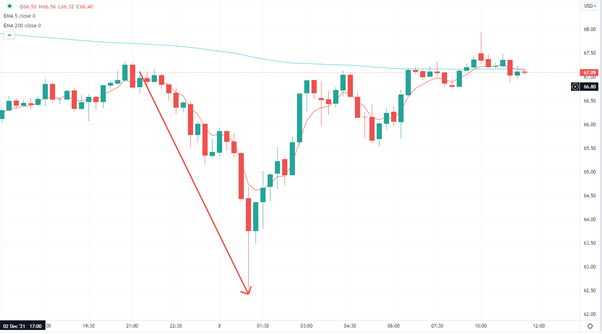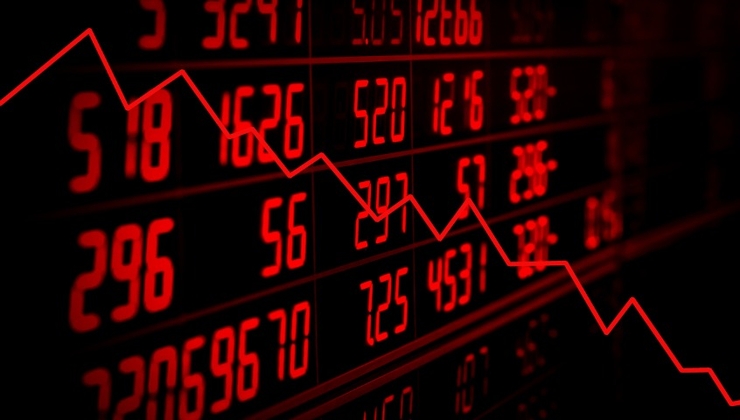- English
- عربي
Many crave volatility, but when it comes, they don’t truly know how to handle or harness it. Volatility shouldn’t radically change the way you trade; if you have a set of rules that trade, say momentum, or mean reversion, those rules don’t change. It’s the components within the process that need to be dynamic to greater range expansion, as well as sharp reversals that play out seemingly on limited news.
Leverage is another important factor here, and again if we see high leverage and high volatility then you absolutely need to nail your position sizing, or you’ll just increase the probability of blowing up the account. Having the correct leverage for the volatility and the position size is always advisable, even before we start the process of placing a trade and managing the exposure.
How much risk one takes in a trade should be dynamic to volatility and range expansion – we can get quite complex with our assessment of volatility, but an ATR is often enough here.
One’s time in a trade may change, especially with so much emotion involved and de-risking/hedging activity that can simply exasperate moves. This means that one’s risk may change as the distance from entry to the stop increases, subsequently, the position size needs to be adjusted lower - but the reward could potentially change from 1.5R to 2R quite easily – the hard part, as always is holding and extracting as much as possible, as noise and doubt impact your psyche.
We need to be aware of the characteristics of movement in a higher vol world – a VIX index above 30% can create emotional trading and may not be for everyone. Market participants have paid up for portfolio hedges for a reason, and a VIX at these levels implies 1.8% daily swings (on average over the coming 30 days) in the S&P500. We can often see the market rally 2% and then swing back 1.5% on no news – just flows.
When we see this type of rapid reaction, it is tough to work from daily timeframes, and one is almost forced to trade-off hourly charts or lower – if the strategy doesn’t work like that then that vol regime is not for you.
My own personal preference is for a VIX between 25-28% - and FX vol a little higher than current levels.
When it comes to movement, crude has been front and centre – what a move we saw, with crude volatility hitting 100 (source crude VIX here).
This was a combination of consensus expectations not being met, with the market having the rapidly recalibrate as OPEC continued with its current output hikes (400kbpd/pm) – clearly this was not expected given the cloud of Omicron and the recent dump of SPR’s. Price really started to fall hard from $66.70, and on the 15-min chart, only really made one higher high (in a bar), all the way down to $62.42, before we saw a huge capitulation move higher.
The interesting angle is OPEC is currently struggling to pump out additional 400K barrels anyhow, and the current run-rate is closer to 270 kb/d – either way, the market is taking this as a sign the group are not worried about future demand impact from Omicron – secondly, the fact OPEC has kept the meeting open on a technical basis means there is a floor under the price and that has seen shorts close as a risk-to-reward trade-off proves to be less compelling.

(SpotCrude 15min chart)
It all led to an interesting candle on the daily chart – that said, we need follow-through to confirm it's put in a low ahead of the August lows.
One to put on the radar, as the poster child of movement – but with US non-farm payrolls today and a weekend of likely Omicron headlines heightening Monday gapping risk, it feels like movement in markets is here with us a little longer. Just be dynamic to volatility, and it pays to respect and adjust to movement within the trading process.
Related articles
Ready to trade?
It's quick and easy to get started. Apply in minutes with our simple application process.
The material provided here has not been prepared in accordance with legal requirements designed to promote the independence of investment research and as such is considered to be a marketing communication. Whilst it is not subject to any prohibition on dealing ahead of the dissemination of investment research we will not seek to take any advantage before providing it to our clients.
Pepperstone doesn’t represent that the material provided here is accurate, current or complete, and therefore shouldn’t be relied upon as such. The information, whether from a third party or not, isn’t to be considered as a recommendation; or an offer to buy or sell; or the solicitation of an offer to buy or sell any security, financial product or instrument; or to participate in any particular trading strategy. It does not take into account readers’ financial situation or investment objectives. We advise any readers of this content to seek their own advice. Without the approval of Pepperstone, reproduction or redistribution of this information isn’t permitted.


